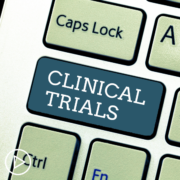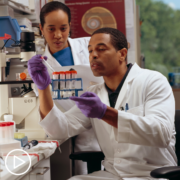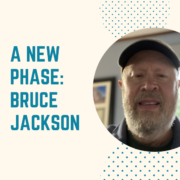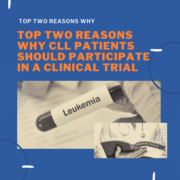How Could Clinical Trials Fit Into Your Myeloma Treatment Plan?
How Could Clinical Trials Fit Into Your Myeloma Treatment Plan? from Patient Empowerment Network on Vimeo.
Considering a clinical trial? Dr. Omar Nadeem, a myeloma specialist, shares advice for talking to your doctor about trials, including key questions to ask your physician about proposed treatments.
Dr. Omar Nadeem is the Clinical Director of Myeloma Cellular Therapies Program and Director of Myeloma and Plasma Cell Pathways at the Dana-Farber Cancer Institute. Learn more about Dr. Nadeem, here.
Related Programs:

|

|

Myeloma Treatment: When Should a Clinical Trial Be Considered? |
Transcript:
Katherine:
As ASH comes to a close, it’s always important to remember that these research advances wouldn’t be possible without patients participating in clinical trials. So, for patients who may be thinking about a clinical trial, when should they consider a trial and what should they be asking their doctor about?
Dr. Nadeem:
Those are great questions and very relevant questions. I think clinical trials come in many baskets. They come in the trials I just described, which are looking at established combinations and then looking to see if the addition of another agent, which is FDA approved, could lead to better results. So, those are some examples of trials where you’re trying to really advance the field by using what we already have available and studying it in either different phases of myeloma therapy or in different combinations.
Those types of trials, I think, are always very important and useful, and from a patient perspective, it should alleviate that anxiety of going on to a study that doesn’t have a track record, per se. And a lot of those trials are done in the newly diagnosed, or the first relapse setting, etcetera.
When you’ve had multiple relapses, though, we know that the disease is still not curable. So, you start to see the benefit of each treatment become shorter and shorter as patients go through their myeloma therapy, and that’s where some of these newer, exciting – especially immunotherapy drugs that are currently under study really, really are promising.
So, I think from a patient perspective, a lot of times that discussion – you’re looking at an agent that’s approved but they might not have the efficacy that we’re seeing in some of the studies.
And I think you have to discuss with your physician at that time to see whatever the clinical trial that we’re discussing or thinking about for a particular patient, what is different about it? Why is it something that they would be thinking about for their individual case? Then really, what is the expectation?
I think what we’re seeing now with all these updated results is that some of these response rates, for example, with bispecific antibodies, which is a form of immunotherapy that we’re studying quite a bit in myeloma, they look twice as good if not three times as good as some of these single agent drugs that were FDA-approved.
So, even though you might want to get the true and tested that’s been studied and cleared, the results that we’re seeing with some of these studies are so much better. So, that’s how the field moves forward. So, I think the discussion with your primary physician is key to see which particular trial, is one available, and two, what they think might be best for that particular situation.










